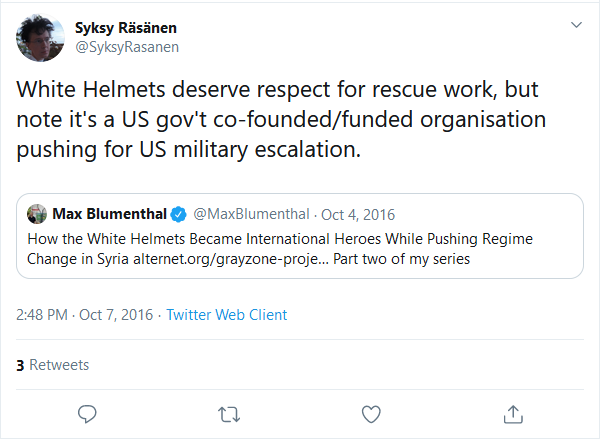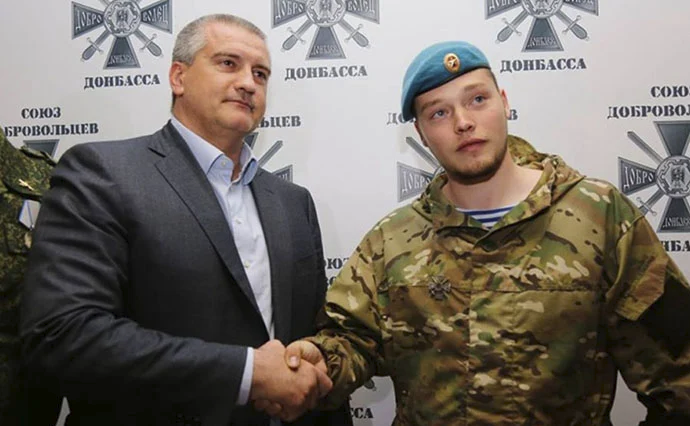In today's #vatnik soup I'm going to introduce a Finnish cosmologist, human rights activist and a board member of @amnestyfinland, Syksy Räsänen (@SyksyRasanen). His stance - at least on Twitter - so far on the Russo-Ukrainian War has been heavily anti-Ukrainian.
1/15
1/15

Räsänen is a internationally recognized cosmologist. He received his PhD from theoretical physics in 2002, and has worked in several prominent universities and organizations, such as Oxford University, CERN and University of Geneva.
2/15
2/15
Syksy was also writing for "Searching for Cosmos" blog ("Maailmankaikkeutta etsimässä" in Finnish) that appeared in a Finnish magazine Science ("Tiede" in Finnish), but stopped because he didn't want to share the platform with Marko Hamilo, whose writings he thought to ...
3/15
3/15

... be right-wing populism. Based on Syksy, he didn't want his fact-based writings to deceive people to think that Hamilo's political views presented in the blog were also scientific.
Like so many others, Räsänen says that he was "awakened" by the writings of Noam Chomsky.
4/15
Like so many others, Räsänen says that he was "awakened" by the writings of Noam Chomsky.
4/15

Räsänen is the chair ICAHD Finland, a "Finnish branch of the Israeli Committee Against House Demolitions, spreading info about the current situation in Israel/Palestine and Finland's role in it".
5/15
5/15

Based on his retweets, Syksy's views seem to be siding with, for example, the Grayzone bloggers and Michael Tracey - their main focus is on US imperialism and at the same time they ignore the imperialistic endeavors of Russia (or Syria, for that matter).
6/15


6/15



Syksy has joined Aaron Maté and Caitlin Johnstone in their efforts to downplay the crimes of the al-Assad regiment in Syria. He has criticized the White Helmets, a volunteer organization that do medical evacuation and urban search and rescue missions, and ...
7/15
7/15

... referred to them being a "US gov't co-founded/funded organization pushing for US military escalation".
He retweeted and promoted a story written by Max Blumenthal on the Grayzone blog about how parts of the 86-page report "If the Dead Could Speak: Mass Deaths and ...
8/15

He retweeted and promoted a story written by Max Blumenthal on the Grayzone blog about how parts of the 86-page report "If the Dead Could Speak: Mass Deaths and ...
8/15


... Torture in Syria’s Detention Facilities" and the following sanctions were actually "a highly deceptive intelligence operation orchestrated by the US and Qatari governments".
9/15
9/15

In his article, Blumenthal also called the report's origins "dubious". Amnesty International called for the arrest of top Syrian regime for these crimes and they were condemned worldwide, also by the Human Rights Watch.
10/15

10/15


Räsänen has suggested that there was a "civil war in Ukraine during 2014-2022". He's also focused on criticizing the Azov Battalion/Regiment as neo-nazis, shared The Grayzone's article about downplaying Putin's/Russia's influence, downplayed Russiagate and other ...
11/15



11/15




... Russian information operations and spread Maté's version of the OPCW inspections about chemical weapon attacks in Douma.
I wanted to add a little personal rant at the end, so here goes:
12/15
I wanted to add a little personal rant at the end, so here goes:
12/15

Russia staged a separatist movement in East of Ukraine already back in 2014, and they were the force behind the initial hostilities. Russia invaded Ukraine illegally and have committed atrocities such as murders, torture, rape, abduction of children, castrations ...
13/15


13/15



... and bombing of civilian targets. In Kherson, they founded a children's torture chamber. Azov Battalion, now called Azov Regiment, has far-right roots which have been allegedly eradicated. Also, there are several prominent neo-nazi figures like ...
14/15

14/15


... Aleksei Milchakov fighting in the Russian/Wagner ranks. Yet, for some reason, well-known Amnesty board members like Syksy do not talk about these issues, war crimes and human rights violations. Isn't that what Amnesty's should be about?
15/15

15/15


Support my work (and get some AI art!): buymeacoffee.com/PKallioniemi
Past soups: vatniksoup.com
Related soups:
Max Blumenthal:
Aaron Maté:
The Grayzone:
Russian nazis:
Past soups: vatniksoup.com
Related soups:
Max Blumenthal:
https://twitter.com/P_Kallioniemi/status/1587377072200208384
Aaron Maté:
https://twitter.com/P_Kallioniemi/status/1588446217033646080
The Grayzone:
https://twitter.com/P_Kallioniemi/status/1609560497384308736
Russian nazis:
https://twitter.com/P_Kallioniemi/status/1597153011838513152
• • •
Missing some Tweet in this thread? You can try to
force a refresh

































